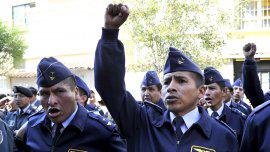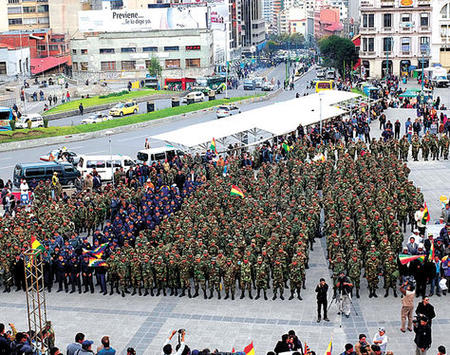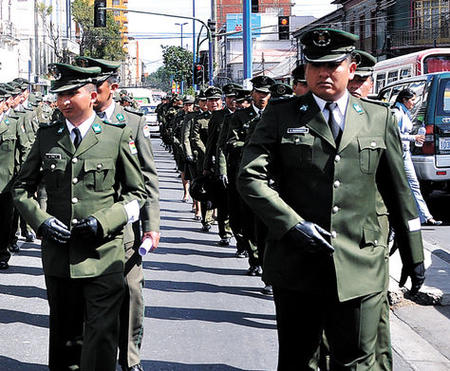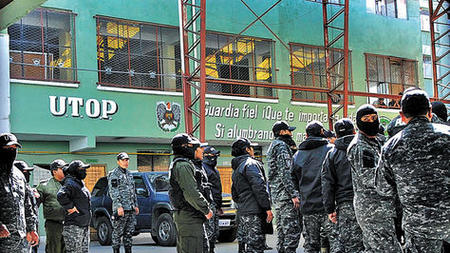In recent months, Bolivia has witnessed dramatic rebellions in the ranks of its national security forces. Last April, several thousand uniformed sergeants and non-commissioned military officers marched through the streets of La Paz and abandoned their barracks, calling for “decolonization” of the armed forces. In early July, police protesters demanding a salary increase forcibly occupied and shut down command centers in 8 of the 9 departmental capitals.
 What is the significance of these protests, and why are they happening now? Given Bolivia’s long history of bloody military coups and anti-government police mutinies, should the events be construed as a threat to the government of President Evo Morales?
What is the significance of these protests, and why are they happening now? Given Bolivia’s long history of bloody military coups and anti-government police mutinies, should the events be construed as a threat to the government of President Evo Morales?
Even in this century, protests by Bolivian security forces rooted in basic labor grievances have had profound political consequences. A police strike during the historic Cochabamba “water wars” in 2000 led President Hugo Banzer to deploy the military into the streets, turning the conflict into a popular revolt which led to his resignation in 2001. In February 2003, a police revolt against an unpopular salary tax provoked a shootout with the military outside the Presidential Palace (“Febrero Negro”), killing dozens and sparking a chain of events that ultimately led to the ouster of President Gonzalo Sánchez de Lozada (Goni) later that year.
Indeed, Vice President Alvaro García Linera, along with the ruling MAS (Movement Towards Socialism) party leadership, has depicted the recent protests as a conspiracy by opposition parties to destabilize the Morales government, possibly with the support of foreign interests. But a closer look reveals yet another example of pragmatic protest politics at work in Bolivia during an election year, as two rival constituencies that have traditionally supported Morales seize the opportunity to advance their sectoral agendas.
The military protest had its origins in a rank-and-file initiative to conform Bolivia’s military code to the new (2009) Constitution. The proposed legislative reforms would allow non-commissioned officers and sergeants, who are primarily indigenous Quechua and Aymará, to advance in rank by enrolling in elite military academies for professional training.
Historically, Bolivia’s 38,000-person military force (including the army, air force, and navy) has been characterized by a pervasive institutional racism, with its top echelons and career officers comprised exclusively of middle and upper class criollo-mestizos, while indigenous troops face significant racial and ethnic barriers to advancement. The Morales government has taken major steps to modernize the military, and to renovate its image—long stigmatized from association with repressive dictatorial regimes—as the guardian of Bolivia’s “process of change.” Still, little has been done to address the deeply-rooted structural problems of racism and inequality of opportunity within the military.
Frustrated by the inability to advance their proposals through regular military channels, the reform group decided in April to break the chain of command. Immediate reprisals by the top brass against 62 non-commissioned officers led to the unprecedented protest marches in La Paz.
The military high command responded by dismissing 715 enlisted troops—more than 7% of the lower ranks of armed forces—for “sedition, mutiny, and engaging in political action.” The leadership refused to negotiate with the rank-and-file’s official association (unions are prohibited in the military). Morales was less than receptive, refusing the protesters’ efforts to meet with him directly, outside the chain of command.
The military’s arbitrary response (characterized by protesters as a “massacre”), together with the popular appeal of their “decolonization” demand, effectively converted the mobilization into a social protest movement with broad-based support. The La Paz marches resumed and escalated, now led by wives and families of the dismissed officers, accompanied by indigenous leaders, human rights activists, neighborhood associations, street vendors, students, and campesinos from twenty provinces. Other military wives went on hunger strike and blockaded the La Paz military headquarters.
Ultimately, close to 90% of the dismissed officers were reinstated, with a commitment for no recriminations. However, 6 association leaders are currently being prosecuted in the military courts, and human rights organizations have documented continuing reprisals against dissenters. Proposed reforms to the military code remain under discussion, through traditional channels that the protesters claim do not represent their interests.
Throughout the protest, rank-and-file leaders continued to profess their support for the Morales government, along with the hope that Morales would intervene to resolve their concerns—just as he had with seemingly favored constituencies such as the cooperative miners, only weeks earlier. “We are not against the government,” said Johnny Gil, head of the non-commissioned officers’ association. “We are against this capitalistic, neoliberal, colonial model in the military.”
Indeed, as opposition senator Marcelo Antezana has noted, the youthful indigenous military protesters—the “children of Evo”—are using the president’s own decolonization discourse to hold him accountable. Today, thanks to economic advancements under Morales, many of their families have acquired the economic means to send them to elite military institutions, creating a revolution of rising expectations. Says ex-MAS governor Rafael Puente, “There is nothing subversive about their demands…They want to be taken in to account by the government they voted for, support, and consider their own.”
 The police protest began in June as a hunger strike by association leaders and their wives, and quickly escalated to the occupation of command posts when dialogue with the government failed to resolve the issues. The protesters’ major demand was a wage increase, including incorporation of an existing bonus into their base salary, indexed to inflation.
The police protest began in June as a hunger strike by association leaders and their wives, and quickly escalated to the occupation of command posts when dialogue with the government failed to resolve the issues. The protesters’ major demand was a wage increase, including incorporation of an existing bonus into their base salary, indexed to inflation.
According to protesters, these concessions were promised by Morales back in 2012, but never implemented. On that occasion, armed rank-and-file officers sacked the national police headquarters and other elite facilities to demand wage parity with the military. In an effort to squelch the revolt before the arrival of the second TIPNIS march into La Paz (and head off a government-alleged conspiracy between police and TIPNIS protesters), Morales deployed military troops into the streets of Bolivia’s major cities, but was ultimately forced to recognize the protesters’ key demands.
This year’s occupation, characterized by similarly violent protest tactics including the use of tear gas against the La Paz police chief, shut down police operations in Bolivia’s departmental capitals for 3 days. The protesters agreed to abandon the buildings voluntarily in exchange for an agreement by the high command to consider their grievances. Discussions are currently ongoing, centered around the government’s offer to consider a salary increase in next year’s (post-election) budget.
Like the military protesters, the dissident police have insisted that their “colors” are not political, but only “olive green.” In contrast to the mass dismissal of military protesters, only one police protest leader has been discharged and threatened with criminal sanctions. The Morales government appears to be more actively engaged in bringing about a resolution of the police conflict. Just days before the protest erupted, Morales advised the police high command in a public speech to “listen to the lower ranks,” who have “good ideas” to contribute, based on their experience.”
Still, public opinion appears to be considerably less sympathetic to the police, who are widely perceived as ineffective, corrupt, and repressive. Unlike the military protest’s focus on inequality and demand for decolonization, which resonated broadly with popular sectors, the police conflict is perceived as just another labor dispute. Some think the wage demands are just, but resent the police having priority over other sectors.
The Morales government has recently fortified the police with modernized vehicles, arms, and uniforms (which, in the past, police were forced to purchase themselves when their poor-quality standard issues wore out). But supporters say the long-promised salary increase is also needed, and would remove a major incentive for police corruption. It would also help to close the gap between police and military wages, addressing the traditional rivalry between the forces that the Morales government is perceived as exacerbating. The timing of the police protest, on the heels of the dramatic military mobilization, can be attributed in no small part to this resentment.
A key issue in both the military and police protests, according to human rights organizations, is the lack of representative channels for lower-ranked recruits to advance their grievances. Both government officials and the top brass have insisted that genuine union activity within the police and military ranks will not be tolerated. This has forced those with legitimate grievances to take extraordinary personal risks, bordering on insubordination, to get their voices heard.
Still, a recent editorial by the daily Página Siete—usually a reliable critic of the Morales government—cautions that “Bolivian society can no longer tolerate mutiny by its armed security forces,” perhaps reflecting a growing public weariness with the protests. In the run-up to the October elections, the extent to which Morales decides to maintain such a hardline stance, or grant meaningful concessions to the police and military, will be largely a political calculus.
Emily Achtenberg is an urban planner and the author of NACLA’s Rebel Currents blog, covering Latin American social movements and progressive governments (nacla.org/blog/rebel-currents).

